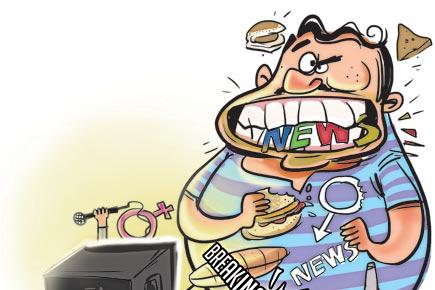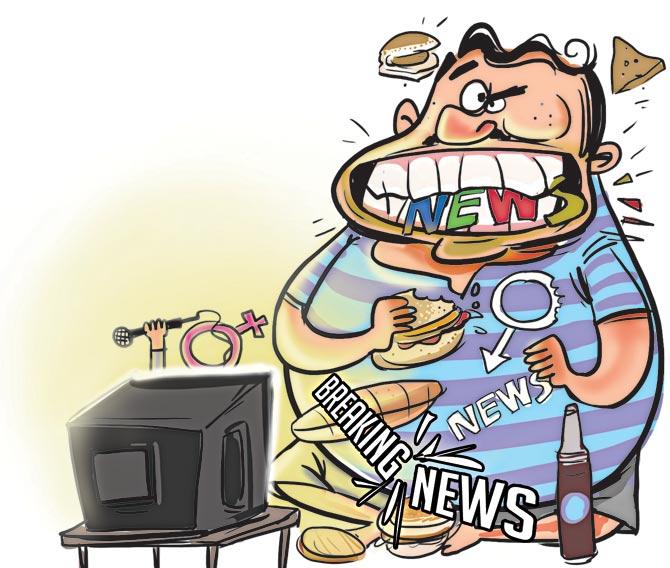We seem to be in a mutually abusive relationship, never leaving each other’s side, then pouncing on each other’s faults. Yaniki, television news and us.

Paromita Vohra
 We seem to be in a mutually abusive relationship, never leaving each other’s side, then pouncing on each other’s faults. Yaniki, television news and us.
We seem to be in a mutually abusive relationship, never leaving each other’s side, then pouncing on each other’s faults. Yaniki, television news and us.
ADVERTISEMENT
It’s difficult not to wonder, yeh rishta kya kehlata hai, when a reporter chases Rahul Mukerjea at the airport plaintively crying, “Speak to me Rahul! Why won’t you say something to me?” Or “Don’t go Mr Das! Take the question Mr Das! Don’t go!”

Illustration / Uday Mohite
It feels like a sari should trail all the way across the screen, as violins wail, while Journo goes from room to room searching for S. Das. Is Sanjay Leela Bhansali ghost directing the Nation at Nine? I want to know!
My friend in Delhi has been calling me periodically to report on the news during the parts where all the panelists start talking together at once and you can’t make out anything. At first she was saying, “What have we become Paro! That a girl could have been missing for three years and no one bothers,” earning honourably cynical responses from me. Soon this became, “What have I become Paro? I barely talked to my daughters for three days? My children have lost respect for me but I can’t make myself move.” As I open my mouth to begin a soothing lecture, she interrupts me with, “Accha, bye, I have to go, they have found the shop where the suitcases were bought.”
Soon, filled with similar self-loathing, and bored by the lack of development, we start writing media analyses. Obviously, those of us who write about it, drink television whisky only for medicinal purposes. Please don’t accuse us of actually wanting to watch. We are doing it for you.
Uske baad, television reporters, filled with their own self-loathing, do some shows on whether the media has gone overboard. This never ceases to bewilder me (I know, my capacity for being bewildered is remarkable) because I still can’t make myself believe that irony is dead.
Usually, when we admit the flaws of People Like Us, we are kinda sorta saying, we are not really like the other People Like Us. We expect others to say, “No no, you are not bad. Bad toh hum hain, paglay!”
But in the case of the media, people go on writing bad things. Nobody is nice to them. Then media people feel bad and say, what can we do haan? We are only producing what people want.
Junk food manufacturers also say the same thing. And we are addicted to junk food even though it only makes us hate ourselves. Could a fast food chain hamburger be tasty and nutritious? Yes, though the company might make a little less profit. OMG what a pinko liberal thought. Perish it.
You could say a lot of news, especially around ‘scandal’ stories, is like gossip. But there’s a crucial difference. Gossip, depending on the intelligence and insight of the gossiper, can also become a revelation, a narrative that is as much about human motivations as it is about our curiosity and schadenfreude. It is the equivalent of street food, chatpata intimacy and a personalised approach between vendor and consumer, which is not strictly necessary for survival.
Unfortunately, the mass production of television news isn’t about giving viewers what they want as much as seeming to do so, just like junk food. It provides instead, meaningless little bits of information liberally sprinkled with electronic MSG. They tantalise, without quite satisfying. We keep hoping the next bite will leave us replete. But like those salty nothings that no one can eat just one of, this rishta too stops only once we’ve made ourselves sick.
Paromita Vohra is an award-winning Mumbai-based filmmaker, writer and curator working with fiction and non-fiction. Reach her at www.parodevi.com
The views expressed in these columns are the individual’s and don’t represent those of the paper.
 Subscribe today by clicking the link and stay updated with the latest news!" Click here!
Subscribe today by clicking the link and stay updated with the latest news!" Click here!







